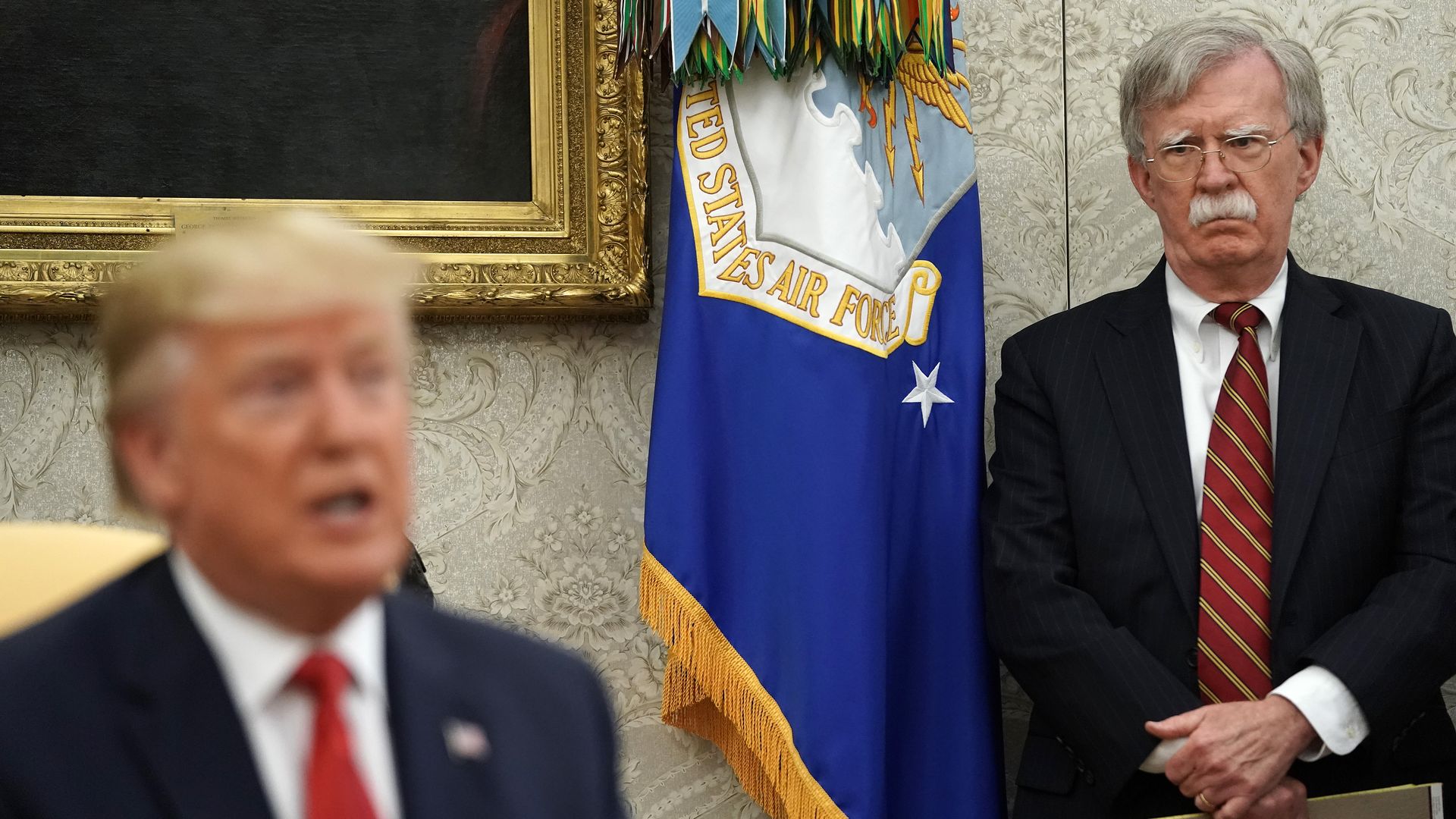Embargo on Venezuela pits U.S. against China and Russia
Add Axios as your preferred source to
see more of our stories on Google.

Photo: Chip Somodevilla/Getty Images
White House national security adviser John Bolton declared in a speech Tuesday morning that the embargo on Venezuela announced Monday night will deny President Nicolás Maduro the funds he needs to sustain his regime.
Why it matters: It has been six months since the U.S. recognized opposition leader Juan Guaidó as Venezuela’s legitimate president, and three months since a U.S.-supported coup attempt on Maduro failed. The drastic new steps are an attempt to regain momentum — but they will inflame tensions with Russia and China, allies of Maduro who receive shipments of Venezuelan oil as a form of debt repayment.
- The new steps mean that virtually any company or individual worldwide that does business with Maduro's regime could face U.S. sanctions.
- That affects two sectors in particular — gold, which is being traded primarily on the black market, and oil, most of which goes to Cuba (which is already under a U.S. embargo), China and Russia.
- Speaking at an international gathering on Venezuela in Peru, Bolton called the support of Moscow and Beijing for Maduro "intolerable."
Between the lines: “We’re poking the Chinese and Russians in the eye and telling them that we’re taking Venezuela very seriously,” says Fernando Cutz, who served as the National Security Council's South America director earlier in the Trump administration. China in particular, he says, will "be very upset."
- “I think the Chinese have been ok with most things we’ve done on Venezuela as long as it doesn’t affect their bottom line. At this point, we’re going after their bottom line,” he says, noting that the move comes in the context of an escalating trade war.
- Cutz says the questions this poses to Russia and China are: “Do they up the stakes on their end as well or do they back down? Is Venezuela as important to them as it is to us?”
- “Perhaps this has gone beyond Venezuela for them now and becomes a question of the U.S. interfering in their affairs by not letting them get their money back.”
More from Bolton’s speech:
- “This is the first time in 30 years that we are imposing an asset freeze against a government in this hemisphere. The Maduro dictatorship is on notice.”
- “The United States has used similar and even more aggressive tools like these in Iran, North Korea, and Syria. Now, Venezuela is part of this very exclusive club of rogue states.”
- “Maduro is at the end of his rope. We see Maduro using his same old tactics, pretending to be interested in a dialogue, when we all know he is just buying time: tap, tap, tapping us all along. We will not fall for these old tricks of a tired dictator.”
Bolton's argument that Maduro will fall imminently rests largely on the idea that he will run out of money, presumably causing key players in the regime to turn on him or unpaid soldiers to revolt.
- Cutz says “that’s been a goal of ours for a while,” but “unfortunately [Maduro] has shown that he’s trickier than we anticipated or hoped for.”
- “Certainly this will hurt him, no doubt,” he says, but some “illicit” funds will continue to flow.
- Cutz points to Iran, North Korea and Cuba as evidence that regime change "does not happen based on sanctions alone." He says they should be used to gain the upper hand in negotiations.
- Bolton downplayed the prospect of a negotiated solution, though, and emphasized that “all options are on the table.”
Bolton noted repeatedly in his speech that U.S. sanctions don't target the people of Venezuela.
- Cutz says that while there are exemptions for humanitarian goods, “the reality is that we’re going to bring more pain on the Venezuelan people."
- He says the idea is to expedite Maduro's downfall, and thus the ensuing economic recovery. "If it doesn’t work," he says, "then I think we’re really putting ourselves in a corner.”
- “When do we pull the plug on this? Do we pull the plug on this? I’d imagine we wouldn’t, looking at Cuba as a model. And then, are we ok for the next several decades kind of imposing something like this?”
Flashback: Elliott Abrams, the U.S. envoy for Venezuela, said last month that he's "absolutely" confident Maduro will fall by year's end.
